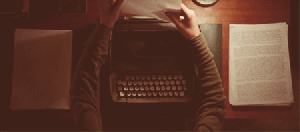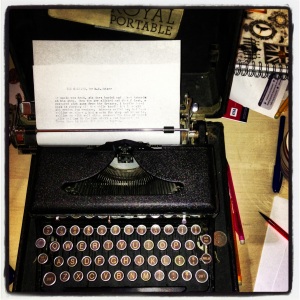Spending the weekend out of London to look after the family dog, my plan was also to spend some quality time writing. I figured I’d get out my typewriter - there’s no where really to keep it in my flat (and the walls are definitely too thin) meaning it currently lives at my parents – so I lug it downstairs and set it up in the kitchen.
I make a coffee. I stack my notes up next to me. I turn on my dad’s epic sound system prepped to blast the soundtrack I’ve put together. Then sitting with a happy dog at my feet, I ready the page, my hands hovering over the keys. And I can feel them: the words at the corners of my mind, so close I can smell the ink… my fingers twitch...
And nothing happens.
Like having that ‘tip of the tongue’ feeling, the words buzzed, blurred and faded before they could become sentiment or sentence.
I tried. I probably wrote two or three pages of first paragraphs and outlines, odd bits of dialogue and random incomplete phrases. But nothing concrete found its way onto the page.
How people write has always fascinated me.
Gore Vidal established the now inevitable coffee/writer relationship, swearing by a ritual of ‘First a coffee, then a bowel movement and then the muse joins me;’ whereas Balzac scribbled furiously for fifteen hours every day (he did succeed in writing hundreds of novels) and fetishised every sentence in editorial. So when it comes to the living, sometimes I desperately wonder: Where do your ideas come from, Mr Gaiman? How did you find the link between birds and brains Mr Powers? What made you want to write, Ms Atwood? And for that matter: what keeps you going?
What keeps them going, what their ‘fix’ is, what’s really going on behind the invisible wall of the page – it’s intriguing as much as it is, perhaps, a little voyeuristic (would you really want to share your bestworst habits with curious minds?).
There’s a book I received, I’d like to say for a birthday, about exactly this ‘Secret Life of Authors.’ Illuming the trinkets and rituals that inspire some of today’s writers, it will one day make excellent toilet reading with each insight coming in page long snippets. Will Self, Ian Rankin, A.S Byatt, Jonathan Lethem, Nicole Krauss, Tash Aw – they all have ‘things’, ‘hobbyhorses’ that inspire or trigger that avalanche of thought.
When I was younger and writing was easier, I never understood why The Adults complained about bleeding into their writing.
Couldn’t they just exist there in the words? All I wanted to do was write: at break time, lunchtime, prep time, dinner time, after dinner, after lights out. I had some great teachers. My French teacher – who you can see giving a TedXTalk – was an Oxford man who used to let me write in his class because if I cared more about words then his lesson, then I should follow that passion. Another, now more commonly know as author Virginia McGregor, even started up a creative writing group in which half the time I’d sit doing my own thing because prompts have never triggered much for me. She allowed it, mostly.
Now, I can sort of see why people who want to write become bogged down. After all, there I was, ready to write, notes at hand, perfect music, perfect day, perfect, perfect, perfect. And nothing. Not an inkling. Not even a hint of an inkling. Stilted. Broken. Blank.
Perhaps I overdid it – there was such a sense of preparation about being on the farm, with the typewriter and the music and the old dog. It was like scheduling a romantic evening then realising it feels like a funeral with the dead flowers and candles and mannered conversation.
So I stopped writing. I turned off the music. I pulled the pages from the typewriter, stacked them on top of my notes (who knows, maybe a flake of genius is in there after all #hoarder). And I went outside with the dog to finish my third coffee.
Right now, I’m sure there’s a few readers shaking their heads.
What’s the first rule of aspiring novelists? Keep going - write – write anything – just bloody write.
But I hate that rule.
I don’t write because other people tell me to finish. I don’t write for the sake of writing. I write for the sake of me. Because when I don’t write it’s like when a hangry person hasn’t eaten.
Obviously, if you want to be a writer then time has to be spent writing. Because if only you’d stop talking about your novel and start writing your novel, because if only you made time for your novel instead of complaining about your work hours, because if only you’d just put one word in front of the other and finish what you’ve started then maybe – maybe – you’ll be en route to being an author.
But it shouldn’t mean sitting with half-formed things twisting beneath your fingers that aren’t ready. Forcing words out for the sake of it shouldn’t be the first titbit of advice to give to anyone writing their book.
Sometimes, that approach can be more damaging than helpful. It can make you resent the work, want to neglect the idea.
Personally, the feeling of Presque Vu is usually because I’m worn through and I need to do something else. It’s not writer’s block (where the blank page is winning so hard it hurts and it really is a matter of writing anything to defeat it), this is the feeling of otherness that comes from too many expectations and pressure. When my head is in it but the rest is pure automaton.
So here’s what I do if writing feels like falsehood.
- Write something else. Blogs are good for this and they often relieve some of that pressure.
- Make notes. Draw plans. Draw characters. Draw a tree or a map. Whatever, do something with your hands.
- Read. Books are good for the soul, make you more intelligent, stave off dementia, and are the blood of good writing. Just ask Hemingway.
- Watch a film – I’m not talking a Netflix binge. Watching something challenging or a documentary that ties into your book can help.
- Drink - coffee, tea, whiskey, Hangman's Blood, pick your poison and have a cup of your favourite brew if you think it'll put you in the zone.
- Talk to yourself. Struggling with dialogue? Act it out. You might look like a lunatic but ask Nerd Cactus and you’ll find at least one of them finds this central to her creative output.
- Talk to someone else – not about writing. Leave the book alone.
- Go for a walk. Go enjoy the outdoors. Get on a bus and go somewhere. Sometimes we spend so much time inside four walls, it’s just not healthful. Visit life.
- Do something you enjoy – whether that’s singing like no one can hear you, dancing around in your underwear, or throwing fruit off a rooftop – go find your happy place.
- Don't beat yourself up over it. If you're writing regularly and not just talking about writing regularly, these days will happen. It's a bad writing day. They're there to make the good ones even better.
Je serai poète et toi poésie,
SCRIBBLER




No comments:
Post a Comment
Scribble Back